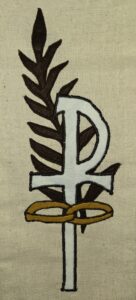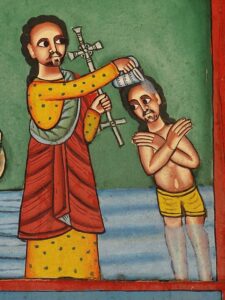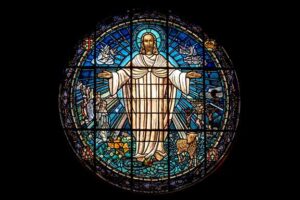When a couple gets married in the Episcopal Church, our canon law requires that they spend some time in pre-marital counseling, usually with the priest who will preside at their wedding. That didn’t happen in this case. I’ve spent no time helping P____ and L____ to build a strong foundation for their marriage; we haven’t talked about the theology of Holy Matrimony, or about communication, or conflict resolution skills, or any of the key issues of married life like dealing with finances, children, and extended family. No, my colleague the Rev. Lisa _______ did all of that. She was supposed preside today, but a member of her family announced that they were getting married today, so she asked me to step in, so it’s my privilege to witness and bless P_____ and L_____’s union.
 In any event, I know that Mother Lisa has been over all of that with them, so this sermon is not for them. It’s for you, their family and friends; it’s about their marriage, but it’s for you.
In any event, I know that Mother Lisa has been over all of that with them, so this sermon is not for them. It’s for you, their family and friends; it’s about their marriage, but it’s for you.
If you were raised in the church you probably went through confirmation classes at some point and had to learn some bits of the catechism. You may remember learning about the Sacraments; there are seven of them. Holy Baptism and Holy Communion are the big ones, the ones Christ himself established. Then there are five others which the church created under, we believe, the guidance of the Holy Spirit. One of those five is the Sacrament of Holy Matrimony.
 One of the things I try to do when I read the stories of Jesus in the Gospels, when he uses an odd or striking metaphor like “I will make you fishers of people”
One of the things I try to do when I read the stories of Jesus in the Gospels, when he uses an odd or striking metaphor like “I will make you fishers of people”
 Again this week as last, our first reading today is from the First Book of Kings and like last week’s, it is a prayer spoken by King Solomon. Last week, it was a private prayer spoken in a dream late at night. Today, it is a public prayer. As long as it was, this reading is just a small part of the dedicatory prayer that Solomon offered when the Temple was finished and consecrated. In it, Solomon asks an important question, “[W]ill God indeed dwell on the earth?”
Again this week as last, our first reading today is from the First Book of Kings and like last week’s, it is a prayer spoken by King Solomon. Last week, it was a private prayer spoken in a dream late at night. Today, it is a public prayer. As long as it was, this reading is just a small part of the dedicatory prayer that Solomon offered when the Temple was finished and consecrated. In it, Solomon asks an important question, “[W]ill God indeed dwell on the earth?” Our gospel reading this morning is taken from the Fourth Gospel, the Gospel according to John, which I’m sure you know is the sort of odd-man-out of the gospels. The other three gospels, the so-called Synoptic Gospels (a Greek word meaning that they see the Jesus story in the same way), pretty much agree and present the events of Jesus’ ministry in the same order over a one-year time-line. John tells the story in a completely different way, with a three-year time span and a different order of events.
Our gospel reading this morning is taken from the Fourth Gospel, the Gospel according to John, which I’m sure you know is the sort of odd-man-out of the gospels. The other three gospels, the so-called Synoptic Gospels (a Greek word meaning that they see the Jesus story in the same way), pretty much agree and present the events of Jesus’ ministry in the same order over a one-year time-line. John tells the story in a completely different way, with a three-year time span and a different order of events.  There’s a story about a pastor giving a children’s sermon. He decides to use a story about forest animals as his starting point, so he gathers the kids around him and begins by asking them a question. He says, “I’m going to describe someone to you and I want you to tell me who it is. This person prepares for winter by gathering nuts and hiding them in a safe place, like inside a hollow tree. Who might that be?” The kids all have a puzzled look on their faces and no one answers. So, the preacher continues, “Well, this person is kind of short. He has whiskers and a bushy tail, and he scampers along branches jumping from tree to tree.” More puzzled looks until, finally, Johnnie raises his hand. The preacher breathes a sigh of relief, and calls on Johnnie, who says, “I know the answer is supposed to be Jesus, but that sure sounds an awful lot like a squirrel to me.”
There’s a story about a pastor giving a children’s sermon. He decides to use a story about forest animals as his starting point, so he gathers the kids around him and begins by asking them a question. He says, “I’m going to describe someone to you and I want you to tell me who it is. This person prepares for winter by gathering nuts and hiding them in a safe place, like inside a hollow tree. Who might that be?” The kids all have a puzzled look on their faces and no one answers. So, the preacher continues, “Well, this person is kind of short. He has whiskers and a bushy tail, and he scampers along branches jumping from tree to tree.” More puzzled looks until, finally, Johnnie raises his hand. The preacher breathes a sigh of relief, and calls on Johnnie, who says, “I know the answer is supposed to be Jesus, but that sure sounds an awful lot like a squirrel to me.” When I find myself in times of trouble,
When I find myself in times of trouble, Our gospel lesson is the shortened version of Jesus’ commission to the twelve as he sends them out to do missionary work. As he continues with their instructions he tells them, “I am sending you out like sheep into the midst of wolves; so be wise as serpents and innocent as doves,”
Our gospel lesson is the shortened version of Jesus’ commission to the twelve as he sends them out to do missionary work. As he continues with their instructions he tells them, “I am sending you out like sheep into the midst of wolves; so be wise as serpents and innocent as doves,” It’s the last Sunday of the Christian year, sort of a New Year’s Eve for the church. We call it “the Feast of Christ the King” and we celebrate it by remembering his enthronement. Each year on Christ the King Sunday we read some part of the crucifixion story. As Pope Francis reminded the faithful in his Palm Sunday homily a few years ago, “It is precisely here that his kingship shines forth in godly fashion: his royal throne is the wood of the Cross!”
It’s the last Sunday of the Christian year, sort of a New Year’s Eve for the church. We call it “the Feast of Christ the King” and we celebrate it by remembering his enthronement. Each year on Christ the King Sunday we read some part of the crucifixion story. As Pope Francis reminded the faithful in his Palm Sunday homily a few years ago, “It is precisely here that his kingship shines forth in godly fashion: his royal throne is the wood of the Cross!”


